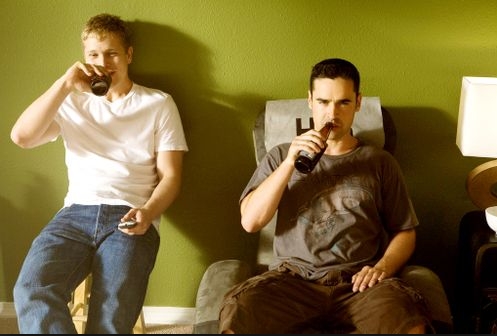I like this. It’s frequently funny, and has some good acting. It’s flaws are the “good” kind of flaws, in that they are thought provoking more than irritating.
The movie consists of various Tucker Max stories merged into a single plot. If you’ve never read Tucker Max, imagine Hunter S Thompson minus all that tiresome journalism crap. A typical Tucker Max story involves him getting drunk, variously charming and insulting people, and otherwise avoiding his inner emotional issues. His stories aren’t great literature – they’re frequently much better.
The movie revolves around three characters: Tucker, Drew (based on SlingBlade) and Dan (a composite of various Tucker Max friends), who go to a stripclub in Salem, lying to Dan’s fiancee in the process. Then begins a series of tragic misadventures where Tucker learns valuable lessons about how to…well, see for yourself. I’ll say this: the film avoids the classic ending where Tucker Max renounces his crazy ways and learns to be a nice guy. It does something more subversive and clever, while still allowing hope for the character.
The acting’s great. Matt Czuchry’s Tucker almost bounces with a likable energy – which he needs, because his role requires him to do very unlikeable stuff. The SlingBlade character is a misanthropic Napoleon Dynamite who sells every line of dialogue like he’s earning a commission. The interesting part of the movie isn’t the story, it’s the energy generated by the three male leads. IHTSBIH makes me feel the same way I feel about South Park – I don’t care much for its supposedly brilliant satire and social commentary, I just like seeing the four kids fooling around.
Unfortunately, the movie has issues. To be fair, so does Tucker Max, and those issues make him attractive to women. Doesn’t really work here, though. This movie’s issues don’t entice me towards buying it a drink, unless it’s a drink of acetone.
A lot of the lighting is pretty terrible. SOME scenes look good (like ones in the school). Others (such as the opening scene) look like they were shot by college kids on a rented Arri. How’d they fuck it up this badly?
But the main problem is the writing.
The dialogue doesn’t sound like something a person would say. It all sounds “written”. The road trip is a good example. SlingBlade gets hungry and goes on a monologue about the wonders of an American fast food chain (“…if you EVER speak ill of the Pancakewich again I will personally force-feed you one while I fuck you in the butt using the wrapper as a condom and then donkey punch you when the infused syrup nuggets explode in your mouth!”). Tucker Max fans will recognize this rant as a word-for-word recreation of a post the real-life Slingblade left on the Tucker Max Message Board. It’s funny in written form, but having an actor deliver it via monologue just sucks all the life from it. People don’t talk like that.
At one stage, Slingblade says Tucker will probably get AIDS, to which he replies “it’s basically curable. It doesn’t even show up in Magic Johnson’s blood any more.” Slingblade skips a beat and replies “so you’re saying Magic Johnson’s black…and has AIDS…and has it better than me?” …but Tucker didn’t say that. The quip wasn’t set up.
This movie made basically no money, which is a shame. At least Tucker stuck to his guns and retained creative control. I recall him saying in an interview that he would never give it to a Hollywood flack to make, because “there’s no chance he would do anything except fuck it up”. So instead, he kind of fucked it up himself. But would anything else be the Tucker Max way?
No Comments »
 In 2008 the two-piece Norwegian collective known as Keldian released their opus Journey of Souls, and entered a period of radio silence. Soon rumors were swirling online – mostly about Justin Bieber’s love life, but also about Keldian’s future. Was the band done? Or was a third album getting ready to emerge?
In 2008 the two-piece Norwegian collective known as Keldian released their opus Journey of Souls, and entered a period of radio silence. Soon rumors were swirling online – mostly about Justin Bieber’s love life, but also about Keldian’s future. Was the band done? Or was a third album getting ready to emerge?
But now Outbound is out, and I can see that the truth was neither of these things. The band isn’t done. And Outbound doesn’t just emerge, it comes at you in front of 180 tons of burning rocket fuel. Holy shit, this album kills! Maybe the best power metal release I’ve heard all year!
“Burn the Sky” fades in with baleful electronic drone, and then launches into an agitated uptempo thrasher with an huge-sounding chorus. I actually looked up the meaning of the lyrics and I wish I hadn’t – something trite and silly about American foreign policy. Oh well. “Earthblood” is more sedate, featuring acoustic guitars and female vocals, but the largeness and sense of grandeur remains.
Then there’s “Kepler and 100,000 Stars”, which switches between a Scorpions-like riff and fast bruising speed metal sections. “Never Existed” and “A Place Above the Air” are huge anthemic stadium-fillers, which is ironic since Keldian never plays live at all, let alone in a stadium. “The Silfen Paths” is lengthy and progressive, seeming to channel Pink Floyd more than Iron Maiden and Helloween, with a spacey bridge that serves as a reminder of Keldian’s origins as an ambient rock band.
But the band has saved the best for last. “FTL” is probably the greatest thing yet to bear the Keldian name. It does not have a boring moment from start to finish – nearly eight minutes of Mach 5 velocity with the band beating on you with their superior songwriting skill. There’s a brief quiet interlude in the middle, featuring JFK’s iconic moon landing speech and a soft reprise of the chorus. The final words uttered in this song seem to answer and challenge the chorus of “Burn the Sky”, adding a sense of closure to Outbound.
There’s nothing to say about Outbound except that my expectations were high and yet were totally surpassed. The band just kicks it up a notch all around – better singing and performing, a larger guitar presence, more organic production, and best of all…it’s really an album!
Keldian’s first two albums listened like collections of songs. This might seem like a strange complaint, since that’s the definition of what an album is. But there’s a difference between ten songs assembled without rhyme or reason, like bedraggled survivors plucked out of the water by a lifeboat, and ten songs working in unity for a common purpose, like a rowing crew. Outbound is the second kind of album. The sum is way better than the parts – and the parts are already amazing.
No Comments »
 Have you ever read a press release from a band hyping their new album, and thought “Wow, this is going to be goddamn terrible. No question about it. Just terrible.”
Have you ever read a press release from a band hyping their new album, and thought “Wow, this is going to be goddamn terrible. No question about it. Just terrible.”
Yes, you have.
The press release itself will be innocuous, packed full of buzzwords and fake hype. But as you read it, your body will start to react. Your palms will sweat. Your spine will tingle. Your spleen will rumba with your kidneys. Your epidermis will hitchhike to Patagonia.
Why is this?
It’s because metal band press releases are written in code. Yes, it’s true. Years ago, CIA analysts worked with John Peel and Earache label reps to develop a secret method of communication called “Subliminal Hype Curtailment.” SHC is necessary due to the confluence of two factors. 1) Bands must lie in order to sell albums, and 2) they are fundamentally good blokes who don’t want to deceive you. So they lie and tell the truth in the same paragraph. To the neophyte, it seems like the album will rule. However, the coded SHC will tell the initiated a different story.
What they say: “the album is live/raw”
What they mean: “…it’s an underproduced rush job”
What they say: “the album is experimental/diverse”
What they mean: “we’ve traded out our old style for whatever’s trendy at the moment. If it was 2001, that would mean rapping and record scratches. But it’s 2014, so we’re all about djent, breakdowns, and EDM. We’ve got to follow our artistic yearnings, and it’s just our good fortunes that those artistic yearnings always seem to point to whatever’s selling records.”
What they say: “you can’t pidgeonhole the new album into a genre.”
What they mean: “you almost certainly CAN pidgeonhole the new album into a genre.”
What they say: “we’re consistent.”
What they mean:: “we’re in a creative rut so deep that it extends right the way through the earth and is a hill in China.”
What they say: “…dedicated fans.”
What they mean: “if I may brag, the drummer’s mum thinks we’re hot shit.”
What they say: “the new album has something for everyone.”
What they mean: “we’re confused, unfocused, and lack identity.”
What they say: “this is an amicable split, and we wish [insert member] all the best with his future projects”
What they mean: “I will commit a stabbing if I ever see that fuckhead again”
What they say: “underground legends”
What they mean: “nobody’s heard of us, nobody attends our shows, nobody gives us any money, and we just ate the bassist’s amp to avoid starvation”
What they say: “our heaviest album yet”
What they mean: “not our heaviest album yet.”
No Comments »



